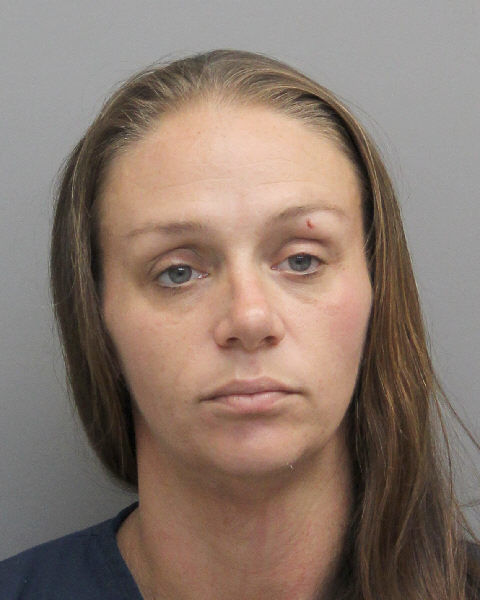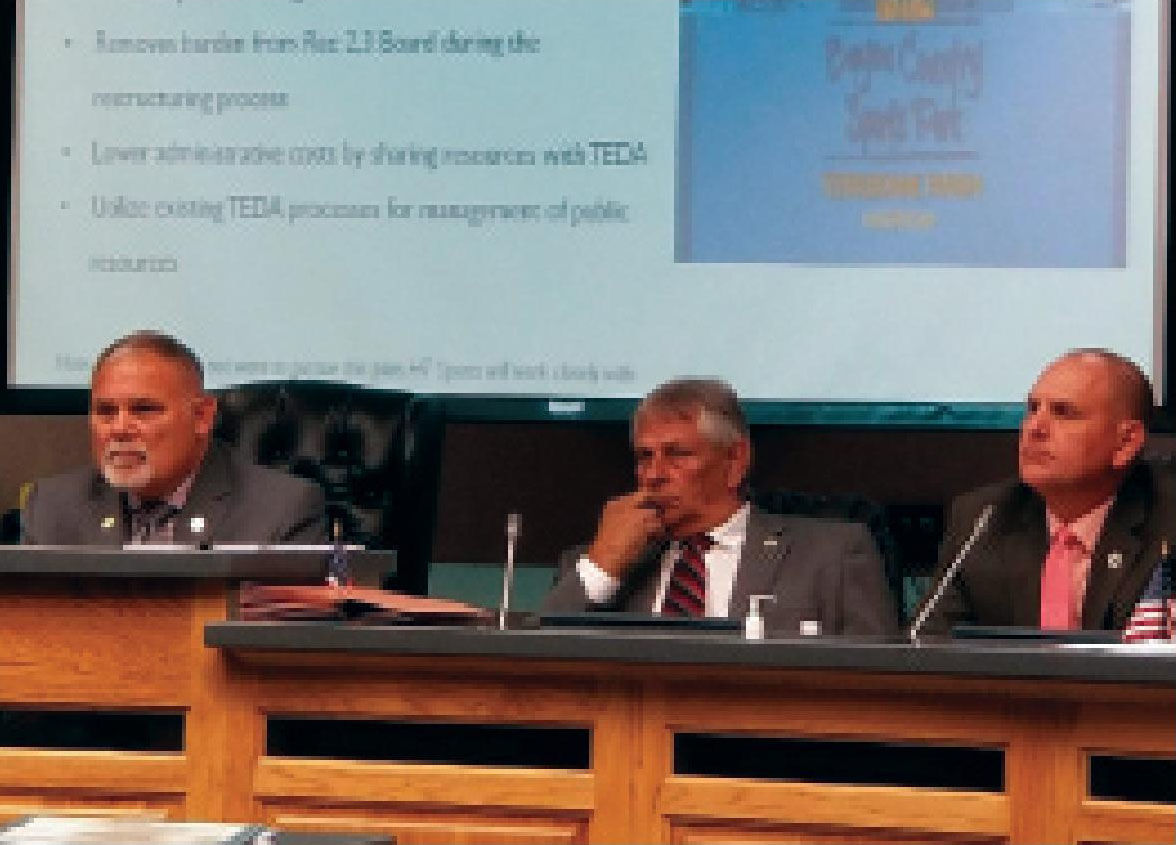There’s lots of blame to go around
June 22, 2018
Woman accused of stealing from an area church
June 25, 2018we’d do is hire a director, manage the maintenance and operations of the park under this scenario.”
The intention is to create a subcommittee to operate through, rather than create a new board structure.
Then Rookard moved on to the question of funding, the following figures which he said were estimates.
“Essentially the idea is, anything that is already committed at this time to the Bayou Country Sports Park we would want to come with the park,” he said. “The working number is $600,000 a year from Rec 2-3 and $150,000 from the general TPR budget to allow us to continue construction.”
One-time funding sources include: the $3-3.5 million Rec 2-3 committed to the park, $750,000, which is 50 percent of the proceeds from the sale of the MLK property, $150,000, additional funding from the TPCG Economic Development fund, and $200,000 from the Parish Recreation Budget.
TEDA’s goals include hosting 12-15 events a year, seeking opportunities to partner with existing events, and finally to create and host events of their own.
Coaches have long said the park’s creation would bring opportunities to the area. Recently, a softball tournament in town generated hotel and restaurant revenue, but the event was capped out in size because of a lack of availability at existence facilities.
“The idea is that we become a host agency and generate revenue to fund the other activities,” Rookard said.
Assuring the council this would not close the park to the public, Rookard said that outside attendees would fund the services. In his presentation, he said that local participants would generate $9.75 per day in new taxes, whereas overnight participants from outside of Terrebonne Parish would generate $46.19 per day in new taxes.
It is important to note that TEDA is factoring total expenditures in the parish, not just those at the park in these estimates. Such expenditures include: hotel rooms, sales-taxes through meals, sporting equipment, and direct costs associated with the event.
“When you’re talking about this many parents in one spot, they’re spending money,” he said. “So whether you care about recreation or not, $26,000 in taxes pays for teachers, police, fire, all these things that are critical for our economy.”
Rookard emphasized that this did not mean the park was only for such events, “But even if it’s successful, it has to be open to the general public,” he said.
He explained that with 15, three-day events, taking up a total of 45 days, this would still leave the park open 320 days a year for the local populace, “If we lose sight of that, we’re going to get a whole bunch of problems,” he said.
This is part of TEDA’s goal to capture a piece of the Sports Tourism industry. Rookard cited a Time Magazine article, which estimated Sports Tourism as a $15 billion per year industry. He said Houma offers strategic advantages to attract such events: mid-size market, hotel options, and a competitive cost structure to name a few.
In seeking these goals, TEDA is working on a brand titled “HT Sports.” TEDA is seeking to hire someone to aggressively recruit sporting events to be hosted in the Houma area.
“When we started looking at the landscape between Rec. 2-3, who controls the Sports Park, TPR and all the other folks involved… really what we identified was about 3 tournaments a year that were planned,” said Rookard. “If you’re going to spend $20+ million to get this event [park], someone has to go out and actively get these events to come to town, or basically we’ve got a big red herring, right?”
Rookard explained that generating revenue and tax dollars is TEDA’s focus. TEDA intends to partner with local facilities and event organizers to harness the potential of their resources efficiently. He said that these events have large overhead costs and TEDA thinks it can start absorbing said costs and, by doing so, help the events grow and increase, thereby increasing tax revenues.
One such facility mentioned was the Houma-Terrebonne Civic Center. Rookard said the negotiations are still in the very early stages, but TEDA would like to take over the planning of sport-related events – Basketball, Volleyball, Rodeo, Indoor Track, Gymnastics, Indoor Soccer, and Martial Arts were mentioned.
This was followed by the Houma Municipal Auditorium, which he said would be better employed in smaller performances, award ceremonies, or registration purposes.
Summarizing the outline of TEDA’s future plans with the Sports Tourism industry, Rookard said that even if the Bayou Sports Park stayed with Rec 2-3, it was still a very important factor to Houma’s economy.
“Regardless if that involves us with Bayou Country, that is a critical asset to Sports Tourism, and something that needs to be taken seriously,” he said. “Whatever structure we end up with, even if it’s 2-3, for management and operations of this park, it needs to be a single entity.”
With Rookard’s presentation concluded, he fielded questions from the council-members, who said they were very interested in further exploring the idea.
“I think what you bring before us is something that’s needed. I think it may be an opportunity to bring that sports park to the next level,” said Gerald Michel. “But the only thing that I’m in disagreement on is an asset transfer. Even if it would be legal, which would really surprise me given so much recreation district money that’s used for it comes from Home Owner’s Taxes, but even if it were legal, then I’m just not for it for that aspect of it. But for ya’ll to come in and be the marketing arm for it, I think is a great idea.”
Rookard said the transfer of asset was for a transfer of control, and that TEDA doesn’t need the asset for any other specific reason, other than that if TEDA is the entity that will be responsible for construction it needs to be in control of the facility.
Councilman Steve Trosclair admitted that he had never attended any TEDA meetings, but added that he thinks the organization is better equipped to handle the park than the recreation districts, given how they’re structured right now.
“I don’t think we’re structured to do that the way we’re structured now, and I’m all for another organization coming in and taking over the operations of it…” Trosclair said. “But my question is, I’ve been on this board for 2 and a half years and nothing’s come across my desk on anything that TEDA has brought into Terrebonne Parish in the form of economic development.”
He clarified that he wasn’t claiming that TEDA hasn’t accomplished anything, just that nothing had jumped out at him. He said that he sought proof that TEDA was up to this task of delivering what they were proposing.
Rookard said this was fair criticism. He said TEDA’s meetings are open to the public and on the seventh floor of Government Tower. He said this was no excuse though, “We need to do a better job as TEDA, of getting that message out and getting before you.”
Councilman Dirk Guidry said that he liked the idea of the facility being put in the hands of TEDA. He said it was important that Terrebonne Parish diversify its economy, and not be so heavily reliant on the oil sector.
Member of the Terrebonne Parish Council listen to a presentation by TEDA CEO Mathew Rookard about the benefits of having TEDA run the planned Bayou Country Sports park.












